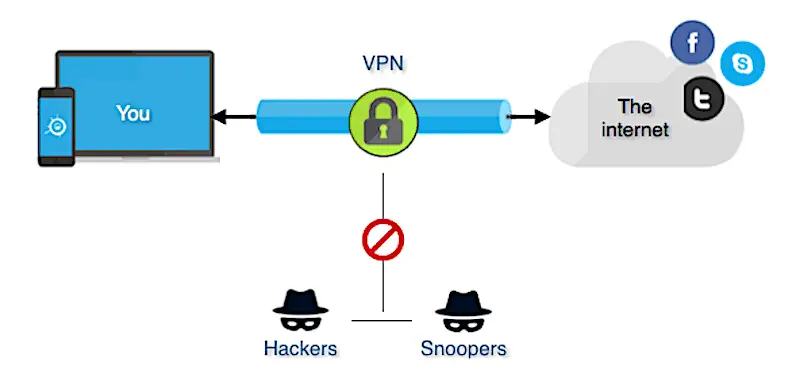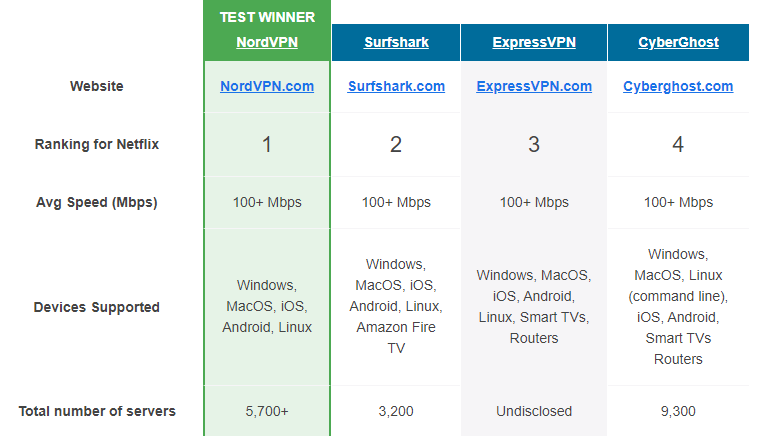VPN – Virtual Private Network
A technology that allows you to create a secure and encrypted connection over a public network, like the Internet. VPNs are commonly used to protect sensitive data, maintain privacy, and bypass geographic restrictions.
The device creates a secure tunnel to the VPN server when a connection is established. All the data you send and receive while connected to the VPN is encrypted, making it difficult for anyone else to intercept or access your information. This is particularly useful when using public Wi-Fi networks.

Some common uses and benefits of VPNs:
Privacy and Anonymity: VPNs can mask your real IP address and location, making it difficult for websites, advertisers, or other entities to track your online activities. It helps protect your privacy by keeping your internet browsing anonymous.
Security: VPNs encrypt your internet traffic, ensuring that your data is protected from hackers, government surveillance, and other malicious actors. This is especially important when accessing sensitive information or conducting financial transactions online.
Geo-spoofing and Bypassing Restrictions: VPNs allow you to connect to servers in different locations, which can help bypass geographical restrictions imposed by certain websites or streaming services. For example, you can access region-restricted content by connecting to a VPN server in the country where the content is available.
Remote Access: VPNs enable secure remote connection to private networks. Businesses commonly use this to allow employees to connect to their corporate networks from outside the office.
How VPNs Work
When you connect to a VPN, your device (e.g., computer, smartphone, or tablet) establishes a secure connection to a VPN server. This connection is encrypted, meaning that all the data transmitted between your device and the VPN server is encoded and protected from unauthorized access. The encrypted data is then sent from the VPN server to its destination on the internet or another network. This process creates a secure tunnel for your online activities.
Encryption Protocols: VPNs use various encryption protocols to secure the data transmitted through the VPN tunnel. OpenVPN, IPSec, L2TP/IPSec, and PPTP are the common protocols OpenVPN is widely regarded as one of the most secure and reliable protocols, while PPTP is considered less secure due to its vulnerabilities.
VPN Server Locations: VPN services typically have servers located in various countries around the world. When you connect to a VPN, you can choose a server location from the available options. The server location you select affects your virtual location on the internet. For example, if you connect to a VPN server in the United States, your online traffic will appear to originate from the U.S., which can be useful for accessing region-restricted content or bypassing censorship.
VPN Logging: It’s important to consider the logging policy of a VPN service provider. Some VPNs may keep logs of your online activities, while others have a strict no-logs policy, meaning they do not record any information about your browsing history or connection details. If privacy is a priority for you, it’s advisable to choose a VPN provider that has a transparent and strong no-logs policy.
Paid vs. Free VPNs: Both paid and free VPN services are available. Free VPNs may have limitations on data usage, connection speeds, or server locations. They may also display ads or monetize your data in other ways. Paid VPNs generally offer more features, better performance, and stronger security. If you decide to use a free VPN, it’s essential to research the provider and understand their privacy practices.
Compatibility: VPNs can be used on various devices and operating systems, including Windows, macOS, Linux, iOS, and Android. Many VPN providers offer dedicated apps or software that make connecting and configuring the VPN on your device easy. VPNs can often be manually configured on routers to secure the entire network.
What are some factors should consider when choosing a VPN provider?
When choosing a VPN provider, it’s important to consider several factors to ensure that you select the one that best meets your needs. key factors to be considered:
Security and Privacy: Look for a VPN provider that prioritizes strong security measures, such as robust encryption protocols (e.g., OpenVPN, IKEv2), secure VPN protocols (e.g., WireGuard), and a strict no-logs policy. Make sure they have a track record of protecting user privacy and have undergone third-party audits or security assessments.
Server Locations and Coverage: Consider the number of server locations and countries offered by the VPN provider. Having a wide range of server locations can help you bypass geographic restrictions and access content from different regions. Additionally, having servers in closer proximity to your location can improve connection speeds.
Connection Speed and Performance: VPNs can potentially impact your internet speed due to the encryption and routing processes. Look for VPN providers that offer fast and reliable connections, with minimal impact on your internet speed. Some VPNs may provide speed test results or offer trial periods to evaluate their performance.
Simultaneous Connections: Consider the number of devices you can connect simultaneously with one VPN account. This is particularly important if you plan to use the VPN on multiple devices, such as computers, smartphones, tablets, and routers.
User-Friendly Interface and Compatibility: Ensure that the VPN provider offers user-friendly apps or software that are compatible with your devices and operating systems. Check if they support devices such as Windows, Mac, Android, iOS, Linux, and routers. A well-designed and intuitive interface can make it easier to set up and use the VPN.
Customer Support: Look for VPN providers that offer responsive customer support channels, such as live chat, email, or phone support. This can be helpful if you encounter any technical issues or have questions about the service.
Pricing and Payment Options: Consider the pricing plans and subscription options offered by the VPN provider. Some providers offer different plans based on the duration of the subscription. Additionally, check if they offer flexible payment options, such as credit cards, PayPal, or cryptocurrency.
Additional features include split tunneling, ad blocking, malware protection, kill switch, multi-hop (double VPN), and DNS leak protection. Assess which features are important to you and whether the VPN provider offers them.
Reputation and Reviews: Research the reputation and reviews of the VPN provider. Look for independent reviews, user feedback, and ratings to get an idea of the provider’s reliability, performance, and trustworthiness.
Do you have any suggestions for VPN providers that meet my criteria?
There are various VPN providers available in the market that offer different features and benefits. Here are some of the popular options:
Express VPN is known for its strong security encryption measures, including AES-256 encryption, support for multiple VPN protocols (OpenVPN, IKEv2, and others), strict no-logs policy fast speeds, and a wide range of servers. The user interface is easy to navigate, and the provider has apps for different platforms.
Nord VPN offers advanced security features like Double VPN and Onion over VPN, along with a large server network and a user-friendly interface.
Cyber Ghost is known for its user-friendly interface and extensive server coverage. It is suitable for beginners and offers strong security features.
Surf Shark provides a good balance of security, speed, and affordability. It has an easy-to-use interface and allows unlimited simultaneous connections.
Private Internet Access (PIA) has strong security features, a strict no-logs policy, and a large number of servers. It offers apps for different platforms and allows up to 10 simultaneous connections.
Proton VPN focuses on strong security and privacy and is developed by the creators of Proton Mail. It offers a free plan with limited features and a premium plan with additional features.
Can you suggest a VPN provider that is suitable for streaming and torrenting?
When engaging in streaming or torrenting activities, it’s crucial to use a VPN to protect your privacy and bypass geographic restrictions. The above VPN providers offer reliable performance, strong security, and the necessary features to enhance your streaming and torrenting experience.
Can you provide me with the list of recommended servers for streaming Netflix Kodi?
Express VPN
Nord VPN
Cyber Ghost


